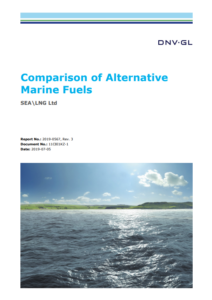SEA\LNG published the results of a new alternative fuels study, finding that LNG is the most mature, scalable, and commercially viable alternative fuel currently available for the maritime industry. The study was conducted by DNV GL.
The study concluded that while there are several lower or zero carbon alternative fuels that could assist in complying with IMO 2030 and 2050 GHG reduction targets, many of these alternatives require significant development to meet the industry’s needs.
[smlsubform prepend=”GET THE SAFETY4SEA IN YOUR INBOX!” showname=false emailtxt=”” emailholder=”Enter your email address” showsubmit=true submittxt=”Submit” jsthanks=false thankyou=”Thank you for subscribing to our mailing list”]
The study reports that many promising alternative fuels currently do not have the regulatory framework, production capability and bunkering infrastructure for broader adoption, and they are also more expensive than traditional bunkers or LNG.
As a result, during a period where the industry is feeling pressure to cut GHG and other emissions to air, LNG could help move the industry forward, while also laying the ground work for lower or carbon neutral fuels produced from renewable or zero-carbon energy.
According to existing industry and academic literature, the study evaluates the commercial and operational viability of six of the main alternative fuels:
- Hydrogen;
- Ammonia;
- Methanol;
- LPG;
- Biofuel in the form of hydrotreated vegetable oil;
- Full battery-electric systems.
It also assesses how they perform against LNG on the backdrop of 11 key parameters, covering considerations like applicability, scalability, economics and environmental performance.
Commenting on findings of the report, SEA\LNG Chairman Peter Keller mentioned:
Modern ships have a life expectancy of around a quarter of a century. Investors need to know how the capital expenditures for installed engines and their operational costs, including choice of fuel, will be impacted by current and future environmental legislation. With several marine fuel options to consider, SEA\LNG commissioned this study from DNV GL to support the industry in its decision-making
Torsten Schramm, President DNV GL – Maritime, added that alternative fuels and propulsion technologies should be on the radar of every shipowner, especially those in the market for a newbuilding in the near future. He explained that LNG can play a key part in enhancing the maritime industry’s emissions to air towards 2030 and on to 2050.
Earlier studies commissioned by SEA\LNG add further weight to LNG’s credentials as a commercially and environmentally sound marine fuel. Namely, independent studies carried out by Opsiana have presented better return on investment from LNG under various scenarios.
What is more, the Life Cycle Greenhouse Gas Emissions Study, performed by independent consultancy thinkstep, indicated emissions reductions of up to 21% from LNG across the entire life cycle from well to wake.
Moreover, when combined with Energy Efficiency Design Index (EEDI) improvements to ship design, LNG could align with the IMO 2030 target for decarbonisation on new ships.
For can find further details on LNG, in the PDF herebelow


































































